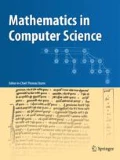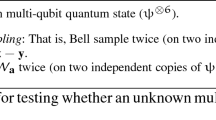Abstract
Asymptotical complexity of solving a system of sparse algebraic equations over finite fields is studied here. An equation is called sparse if it depends on a bounded number of variables. Finding efficiently solutions to the system of such equations is an underlying hard problem in the cryptanalysis of modern ciphers. New deterministic Improved Agreeing-Gluing Algorithm is introduced. The expected running time of the algorithm on uniformly random instances of the problem is rigorously estimated. The estimate is at present the best theoretical bound on the complexity of solving average instances of the problem. In particular, this is a significant improvement over those in our earlier papers (Semaev, Des Codes Cryptogr 49:47–60, 2008; Semaev, SIAM J Comput 39:388–409 2009). In sparse Boolean equations a gap between the present worst case and the average time complexity of the problem has significantly increased. We formulate Average Time Complexity Conjecture. If proved that will have far-reaching consequences in the field of cryptanalysis and in computing in general.
Similar content being viewed by others
References
Bouillaguet, C., Chen, H.-C. K., Cheng, C.-M., Chou, T., Niederhagen, R., Shamir, A., Yang, B.-Y.: Fast exhaustive search for polynomial systems in F 2. IACR ePrint Archive, report 2010/313
Bardet, M., Faugére, J.-C., Salvy, B.: Complexity of Gröbner basis computation for semi-regular overdetermined sequences over F 2 with solutions in F 2. Research report RR–5049, INRIA (2003)
Bardet, M., Faugére, J.-C., Salvy, B., Yang, B.-Y.: Asymptotic Behaviour of the Degree of Regularity of Semi-Regular Polynomial Systems. In: MEGA (2005)
Buchberger B.: Theoretical basis for the reduction of polynomials to canonical forms. SIGSAM Bull. 39, 19–24 (1976)
Courant R.: Differential and Integral Calculus, vol. 1. Interscience Publishers, New York (1988)
Courtois, N.T., Bard, G.V.: Algebraic cryptanalysis of the data encryption standard. In: Cryptogr. and Coding, LNCS 4887, pp. 152–169. Springer, New York (2007)
Dantsin E., Goerdt A., Hirsch E.A., Kannan R., Kleinberg J.M., Papadimitriou C.H., Raghavan P., Schšning U.: A deterministic (2−2/(k + 1))n algorithm for k-SAT based on local search. Theor. Comput. Sci. 289, 69–83 (2002)
Eén, N., Sörensson, N.: MiniSat home page. http://minisat.se/
Faugère J.-C.: A new efficient algorithm for computing Gršbner bases (F4). J. Pure Appl. Algebra 139, 61–88 (1999)
Faugère, J.-C.: A new efficient algorithm for computing Gröbner bases without reduction to zero (F5). In: ISSAC 2002, pp. 75–83. ACM Press, New York (2002)
Iwama K.: Worst-Case Upper Bounds for kSAT. Bull. EATCS 82, 61–71 (2004)
Iwama, K., Seto, K., Takai, T., Tamaki, S.: Improved randomised algorithms for 3-SAT. In: ISAAC 2010, Part I, LNCS 6506, pp. 73–84 (2010)
Kolchin V., Sevast’yanov A., Chistyakov V.: Random Allocations. Wiley, New York (1978)
Lazard, D.: Gröbner-bases, Gaussian elimination and resolution of systems of algebraic equations. In: EUROCAL, pp. 146–156 (1983)
MAPLE home page. http://www.maplesoft.com
Papadimitriou, C.H.: On selecting a satisfying truth assignment. In: Proc. FOCS’91, pp. 163–169 (1991)
Raddum, H.: Solving non-linear sparse equation systems over GF(2) using graphs. University of Bergen (2004, preprint)
Raddum H., Semaev I.: Solving multiple right hand sides linear equations. Des. Codes Cryptogr. 49, 147–160 (2008)
Schöning U.: A probabilistic algorithm for k-Sat based on limited local search and restart. Algoritmica 32, 615–623 (2002)
Semaev I.: On solving sparse algebraic equations over finite fields. Des. Codes Cryptogr. 49, 47–60 (2008)
Semaev I.: Sparse algebraic equations over finite fields. SIAM J. Comput. 39, 388–409 (2009)
Semaev I., Mikus M.: Methods to solve algebraic equations in cryptanalysis. Tatra Mt. Math. Publ. 45, 107–136 (2010)
Semaev, I.: Improved agreeing-gluing algorithm. 2nd Int. Conf. on Symb. Comp. and Crypt., Royal Holloway, University of London, pp. 73–88 (2010)
Semaev I.: Sparse Boolean equations and circuit lattices. Des. Codes Cryptogr. 59, 349–364 (2011)
Schilling, T.E., Raddum, H.: Solving equation systems by agreeing and learning. In: WAIFI 2010, LNCS 6087, pp. 151–165. Springer, Berlin (2010)
Wiedemann D.H.: Solving sparse linear equations over finite fields. IEEE Trans. Inf. Theory 32, 54–62 (1986)
Yang B.-Y., Chen J.-M., Courtois N.: On Asymptotic Security Estimates in XL and Gröbner Bases-Related Algebraic Cryptanalysis, LNCS 3269, pp. 401–413. Springer, Berlin (2004)
Zakrevskij, A., Vasilkova, I.: Reducing large systems of Boolean equations. 4th Int. workshop on Boolean problems, Freiberg University (2000)
Author information
Authors and Affiliations
Corresponding author
Rights and permissions
About this article
Cite this article
Semaev, I. Improved Agreeing-Gluing Algorithm. Math.Comput.Sci. 7, 321–339 (2013). https://doi.org/10.1007/s11786-013-0163-8
Received:
Revised:
Accepted:
Published:
Issue Date:
DOI: https://doi.org/10.1007/s11786-013-0163-8



